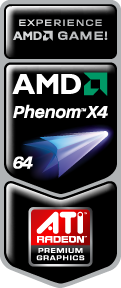 And now another message from the “PC games aren’t dead” department. Advanced Micro Devices is kicking off a campaign today to put the equivalent of a “Good Housekeeping” seal of approval on computers capable of playing PC games.
And now another message from the “PC games aren’t dead” department. Advanced Micro Devices is kicking off a campaign today to put the equivalent of a “Good Housekeeping” seal of approval on computers capable of playing PC games.
The Sunnyvale, Calif. maker of PC microprocessors, graphics chips and chip sets wants everyone to know that cheap $400 computers with cheap Intel graphics aren’t good enough to run many top-rated PC games. By and large, this is true. Intel’s graphics, which are integrated into its chip sets on the computer’s motherboard, often fail to run the top-ranked games that require discrete graphics chips on add-in cards.
AMD is going to provide computer makers with an “AMD Game!” logo to put on computers that can run most games. And it will provide an “AMD Game Ultra” for high-end machines that can run the most demanding games, such as Crysis. AMD will list the specs for its microprocessors, chip sets, and graphics chips that are required to get the logos.
If consumers pay heed to the logos, says AMD, they’ll get a much better gaming experience, which should result in fewer returns for vendors and an expansion of the PC gaming audience.
Godfrey Cheng, Platform Marketing and Gaming Director at AMD’s Graphics Products Group, said in a conference call that roughly two-thirds of the computers sold at retail are good for web surfing but can’t play computer games. That’s stifling the PC gaming industry, whose sales have been flat at $1 billion or so at retail. (See more discussion below).
A lot of the time, Cheng said, many buyers just don’t know that their machines are so under-powered when it comes to game graphics. They buy the machines, install games, and only then learn that the computer is too weak for the job.
“You get a really bad experience,” he said, and that drives gamers to the consoles.
So far, vendors that have joined the program include Alienware, Microsoft, Sapphire, and Acer.
Cheng said the organization’s goals are complementary to the PC Gaming Alliance, which is working on its own standards for simplifying PC game hardware. The alliance includes Intel, Nvidia, and a variety of other companies selling stuff to gamers. AMD Game! is simply one company’s opinion on what’s required to run computer games.
Does computer gaming need all of this help? Console games are growing at a much faster rate than PC games. In that respect, it needs a lot. But Cheng notes that the perceptions of PC gaming’s demise are overblown. Gaming research company DFC Intelligence estimated there were 263 million PC gamers in 2007. And worldwide spending on PC games is expected to hit $9.6 billion in 2008, up 16 percent from a year earlier. Cheng also cited an AMD survey that found half of all new PC buyers play games on their computers.



